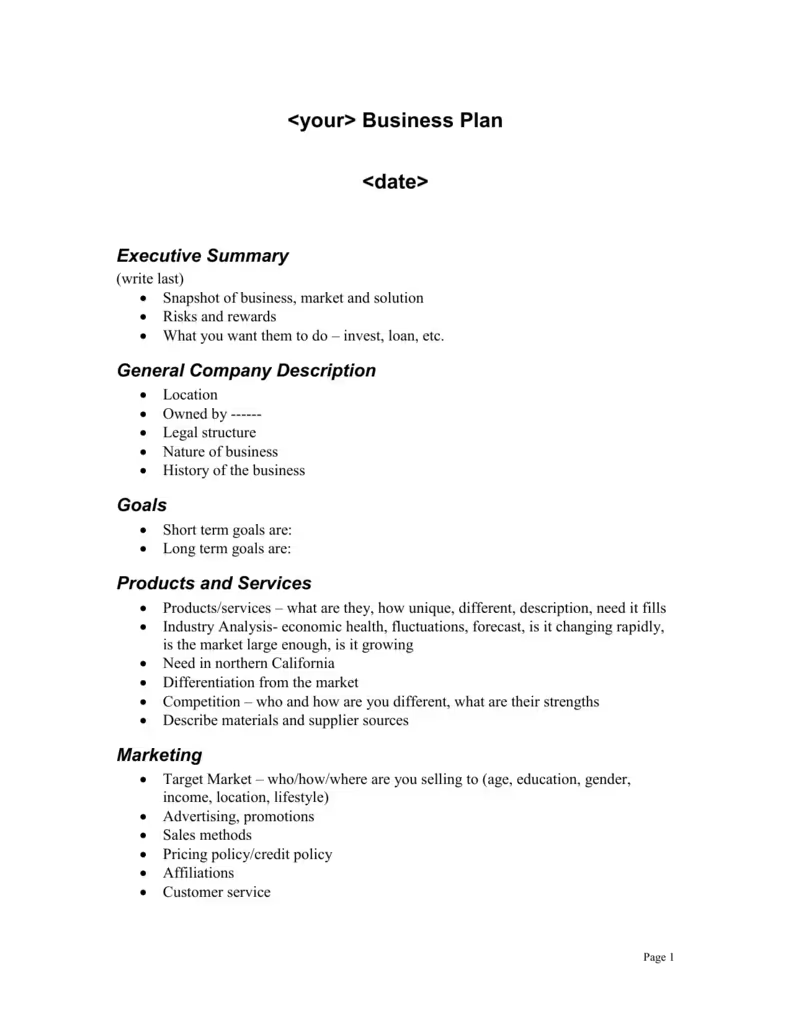A Beginner’s Guide to Writing a Business Plan
04/03/2025
Business
A clear business plan is your roadmap to success—this guide breaks down the basics to help you build one with confidence.

Whether you’re starting a new business venture or looking to grow your existing business, writing a business plan can be intimidating. But, don’t let that put you off – it’s an important step in setting up a successful business and one that should not be overlooked! When you are ready to write your business plan, there are certain steps you should take in order to make sure it is as effective as possible. Eager to turn your entrepreneurial visions into tangible success but unsure of the initial steps? Look no further—The Branded Agency stands ready to guide you! As a dedicated startup branding agency, we're experts in propelling startups and small businesses forward through our extensive digital marketing and branding services. Covering every base from research & analysis to business planning & investor pitch decks, and crafting compelling marketing strategies, we've got your needs fully addressed! Connect with us today, and let's collaborate to transform your dreams into reality.



A Comprehensive Guide to Writing a Business Plan



Quick Tips for Writing a Business Plan
First, gather all the information that will be necessary for your plan.
This includes basic information about the company, such as its name, mission statement, and strategy.
Additionally, include financial data like income statements and balance sheets.
Information about customers and target markets can also help you craft an effective plan.
Next, outline your plan by breaking it down into sections.
Each section should contain detailed information on one aspect of the business.
Begin with an executive summary that gives a brief overview of the company’s goals and objectives.
Then go into more detail about how you intend to achieve them.
Be sure to include sections on marketing, business development, operations, and finance.
These should all be organized in a logical manner so that readers can easily understand the flow of your plan.
Finally, proofread your plan before submitting it for review.
Make sure there are no typos or grammar mistakes as these could be off-putting to potential investors or lenders.
Additionally, use clear and concise language, avoiding industry jargon if possible.
Your plan should communicate precisely what you intend to do and why it is important for your business’s success.
Keep Reading to get our Step by Step Guide to Writing a Business Plan.
In this blog post, we've provided you with a step by step guide to writing your own business plan, however, not everyone has the time, knowledge or experience to do this, you may want to consider hiring an expert to help you with this process.
Looking for Business Plan Writers in Vancouver?
Does your startup business need help writing a business and marketing plan?
The Branded Agency is a full service digital marketing and branding agency located in Vancouver, Canada and our services include everything a startup business needs.
We will help you with your brand positioning, brand strategy, marketing strategy, business strategy and will write a business and marketing plan that will help guide you and other key stakeholders from start to finish.
Our business plans by our business planning experts are top notch and will help you get business loans, VC funding and other investments, if needed.
The Branded Agency Offers Business Plans, Marketing Plans and Investor Pitch Deck Services
At The Branded Agency, we understand the importance of having a well thought-out business plan and investor pitch deck.
We have written hundreds of plans for businesses in different industries over the years, so you can be sure that your business plan will be tailored to meet specific requirements.
Our team of experienced writers and business plan makers have worked with startup companies, small business owners, entrepreneurs and investors to create successful plans.
We will help you outline your objectives, set measurable goals and benchmarks, define strategies for reaching those goals, and develop actionable steps to reach them.
Our experienced writers understand the importance of having a well-defined strategy that can be presented in an investor pitch deck.
We create investor pitch decks that are professional, easy to understand, and visually appealing.
The investor pitch deck should tell a story about your business and explain why investors should consider investing in it.
Our experienced writers will help you to craft a compelling story that will capture the attention of potential investors.
If you’re looking for a reliable business plan writing service in Vancouver, The Branded Agency can help.
Our team of experienced writers will create a business plan and investor pitch deck that meets your needs and helps you reach your goals. Contact us today to learn more about our services!
Alternatively, keep reading for our step by step guide to writing your own business plan.
With that in mind, let’s take a look at some of the key things you need to know about writing a business plan.
First and foremost, it’s important to remember that your business plan is not just a piece of paper – it’s your roadmap for success.
As such, you should always keep this document up-to-date with any new information or changes that occur within your company.
When it comes to the actual writing process, there are a few key elements that you should keep in mind.
To start with, be sure to focus on what sets your business apart from others in your industry – this is one of the most critical parts of any business plan.
You’ll also want to outline your goals and objectives for the future, as well as how you plan to achieve those goals.
And finally, don’t forget about the financial side of things – it’s important that you provide an accurate picture of your current financial situation as well as a realistic estimate of how much money you will need in order to grow.
Also, if you're a novice business owner and do not want to risk your personal assets in case your business fails, it's always beneficial to form your new venture as an LLC using the best LLC formation services available in your state.
If you’re looking for additional help with writing a business plan, there are plenty of resources available online that can provide you with the support you need to get started. With just a bit of research, you’ll be on your way to crafting an effective, successful business plan in no time!
In this short guide, I'll show you everything you need to know to write your own business plan — even if you've never written one before.
Don’t have the time and expertise to write your own business plan?
The Branded Agency is a full service branding and marketing agency that can help you with all of your business needs.
What is a business plan?












A business plan is a document describing your company's goals, mission, and objectives.
It also includes the strategies you intend to use to achieve these goals.
A business plan is a road map for your company's future.
It's an essential tool for any business owner who wants to succeed in their chosen field.
Business plans are essentially made up of two parts: a description of your business and an explanation of how you'll make money from it.
Why do you need a business plan?
A business plan is a tool to help you set goals, identify risks and manage change.
It also allows you to evaluate your progress against your objectives.
A good business plan can be used as a basis for raising finance from investors, banks, or other institutions such as government agencies or development agencies.
The primary purpose of a business plan is to set out how you will start, run and grow your business.
It should also help you focus on critical areas where improvements are needed so that you can achieve your goals and ensure that nothing gets overlooked along the way.
What should you include in your business plan?
A well-written business plan is a living document that will change as your business changes.
There are no hard and fast rules about what should be included in your business plan, but there are some guidelines worth following.
There are multiple templates online, but generally, your Business Plan Should Include:
Executive Summary:
A brief introduction to your company and your business plan.
This section should be no longer than a page or two, but it is required by most investors and banks.
Company Description:
Here you’ll provide an overview of what your business does and why it’s unique – this will usually include things like your mission statement, any awards or recognition you may have received, and a description of your target market.
Product/Service Description:
Here you’ll provide detailed information about the products and/or services that your business offers to customers.
It’s important to be as specific as possible here, since this is one of the most important sections for potential investors and lenders when it comes to evaluating your business.
Market Analysis:
Here you’ll provide an overview of the market, industry, and target customers that your business serves.
You’ll also want to include details about any competitors in this section, as well as how your company plans to stand out from the crowd.
Sales Strategy:
Here you’ll provide a detailed plan for how your company will market and sell its products or services.
This should include information about things like pricing, marketing channels, and any other strategies that you have in place or are planning on implementing.
Operations Plan:
With this section, you’ll provide a detailed overview of all aspects of daily operations for your business.
This should include things like Human Resources, Accounting, IT and Technology, and so on.
Financial Plan:
Last but not least, you’ll need to outline how you plan to finance your business and make it profitable in the future.
You’ll need to provide information about how much money you expect to bring in, as well as how you plan to spend that money once it’s in your bank account.
Executive Summary
A short summary explains what your company does and why it's valuable to potential buyers or investors.
This is the most crucial part of your business plan because it's often the first thing people read when they review it.

An executive summary should be no longer than one page and include essential information about your company's financials, management team, and product or service offerings.
Investors want specifics about your business before they invest in it — that's what the executive summary is all about!
Company Description
This section describes your business, including its objectives and strategies for achieving those goals.
A detailed description of your company's history, business idea, mission statement, and goals for the future. Include any special features that differentiate you from competitors (i.e., patents or intellectual property).
If possible, include information about how customers benefit from using your product or service (e.g., increased productivity due to reduced waste).

Also, briefly explain how you'll grow over time — more customers, more products or services — and how you'll achieve that growth.
It is essential to include this information in your business plan so investors can see how the company will grow with the addition of their funds.
Products and Services
This section should describe the goods you will provide, the markets you will serve, and how you will differentiate yourself from your competitors.

Products and services are the products or services that your business will provide. Your product may be tangible, such as a car or computer, or intangible, such as a service like accounting or legal advice.
Products and services are important to include in your plan because they tell people what your business is about.
If you are providing legal services, for example, then you should include some details about what types of cases you will handle.
If you're selling cars and trucks, then you should include information about how many models and brands you will carry.
If possible, find out what your competitors are offering before you start writing your business plan so that you can compare yourself to them. This will help you decide what products and services you should offer, as well as where your strengths lie relative to theirs.
If you are selling a product, write about:
- What the product is (for example, an iPhone case)
- What it does (provides protection for an iPhone)
- Why people need it (keeps their expensive phone safe)
- How it works (magnetic closure)
- How much did it cost (US$25)
- Who buys it (people who have an iPhone)
- Where it’s sold (online store)
Marketing Strategy
This section describes how you plan to reach customers and how you plan to get repeat customers. It also includes information about any advertising campaigns or promotions you have designed.
The marketing strategy is one of the most essential parts of your business plan, and it's where you bring in the big guns.
Marketing is about creating demand for your product or service, so it's a good idea to have some strategies ready before you launch. The marketing strategy section should include:
A description of your target market. Who are they? What do they like? What do they spend money on? Why would they buy from you?
A description of your competition. Who else competes with you for customers? How do you compare to them? What makes you stand out from the crowd? If there's no competition, how can you change that?
An overview of your distribution network. Will you sell directly to consumers or through retailers and wholesalers? Will you use online sales channels like Amazon or eBay or just concentrate on traditional brick-and-mortar stores?
The Marketing Strategy is the section where you use the Marketing Mix (Four P’s: Product, Place, Promotion, and Price) and SWOT Analysis (Strengths, Weaknesses, Opportunities, and Threats).
This section can be further expanded in your company’s marketing plan - a much more comprehensive document on your marketing and sales.
Financial Projections
This section predicts how much money your company expects to make over a period of time (usually three years to five years). It also predicts how much money will be needed to keep operating during that period and how much money will be available for reinvestment or expansion once your original startup costs have been paid off.

This section can be the most difficult for a new entrepreneur to write because it requires that you be able to project future performance based on past performance and current trends.
This can be tough if you don't have much experience in the industry or with similar businesses.
Financial forecasts can be as detailed or simple as needed for each company.
For example, if you are launching a startup and have no history or data from which to forecast, your forecast may consist only of an estimate of sales volume and profits over time.
Suppose you have been operating for several years and have some historical data about sales volume, expenses, and profits. In that case, you will likely want to include more detail in your financial projections.
For example:
Sales Revenue: $1 million per year (increase by 10% per year)
Costs: $700,000 per year (increase by 5% per year)
Profit: $300,000 per year (increase by 5% per year)
In addition to the example above, you can include information about expenses, such as payroll and advertising costs.
You may also want to include more detailed financial projections if you are planning for several years into the future.
Management Team
This section provides a brief description of the people who will be running the company and their qualifications for doing so, in addition to biographical information on each member of the team (name, age, education, experience).
The management team is an integral part of the plan.
The management team is made up of the people who will be running the business. They include but is not limited to:
The owners or partners in the business.
The general manager or operations manager.
This person is responsible for ensuring that production, sales, and distribution activities are carried out efficiently and effectively.
The marketing manager or director of sales.
This person is responsible for identifying customer needs and wants, developing marketing strategies to meet those needs, and promoting the company’s products or services.
The financial manager or controller.
This person monitors all financial matters in the organization and prepares financial reports regularly to help ensure that profits are maximized while costs are controlled.
Want to learn more about brand platforms, Brand Strategy and Brand Identity? Keep reading!
If you need help with your companies brand strategy and identity, contact us for a free custom quote.
How to find Examples of well-written business plans for Inspiration?

18 Best Sample Business Plans and Examples by Hubspot
In this blog post, you will get beginner business plan templates to templates for established businesses.
Hubspot has created a list of templates that you can use for business plan writing.
You can try the business plan writing sample templates grouped by Hubspot from various resources when writing a business plan for your business.
500+ Business Plan Examples by Bplans
This is a free list of business plans by Bplans for every kind of business you can think of (ex: a business plan for creative agency ).
Here you can find all kinds of business planning ideas, and you can edit them based on your business requirements.
Bplans make your job of planning and creating a business plan for your business easy.
A business plan is like laying out the roadmap for your business’s growth
Having a business plan can help you set up your business, and it can help you keep track of your progress over time.
Getting professional advice when creating your plan is a good idea, mainly if it’s your first go at establishing the business.
Making sure you write about your plans for the future and not just what has already happened will also help keep people interested in reading through your plan.
Additional Business Plan Information
Traditional Business Plan Includes Cash Flow Statements
Cash Flow Statements are planning to borrow money from a lender or investor, it is important to include an accurate cash flow statement in your business plan.
A cash flow statement details how much money you expect to bring into the business and how much will be spent over a given period of time.
This information helps financial institutions decide whether or not they should invest in your company.
Market Research
Plan to compete in a specific industry or market, it’s important to include market research in your business plan.
Market research will help you assess the size of the potential customer base and evaluate competitors who are already in the market.
This information is critical for determining if there is room for your business to succeed.
Break-Even Analysis
’re making a business plan to obtain funding, you may need to include a break-even analysis.
This will help lenders and investors understand when your company can become profitable.
Break-even analyses are based on the costs of running the business and how much revenue is needed for your business to break even.
It takes into account both fixed and variable are planning to start a business, writing a comprehensive business plan is an important step.
It will help you gain clarity on the goals and objectives of your business, identify potential roadblocks along the way, and set out strategies for success.
With thoughtful research and careful planning, writing a good business plan can be an invaluable tool in achieving your entrepreneurial dreams.
Lean Business Plan VS Robust Business Plan
If you are small business getting started and you need to create a business plan quickly, then you may want to consider creating a lean business plan.
This type of plan is more focused on the essential elements for launching your business and will help you get your idea off the ground quickly.
Business Loan requires Financial Health and Financial Data
If you are seeking funding from a bank or other financial institution, you’ll likely be expected to provide detailed financial information as part of your business plan.
This can include income statements, balance sheets and cash flow statements.
These documents are important for demonstrating the overall financial health of your business, which is essential if you’re trying to obtain and are interested in learning more about business plans and how to write one, then Bplans has the resources you need.
We have a library of sample business plans that can give you an idea of what yours should look like.
Competitive Analysis for a Competitive Advantage
If you’re looking to have a competitive advantage in your industry, then you may want to include a competitive analysis in your business plan.
This will help you understand the strengths and weaknesses of your competitors, and identify any potential opportunities that you can exploit.
Knowing this information can go a long way towards helping you create a successful business strategy.
Business Model Definition:
Managing a business means more than just creating a product or service, it also includes figuring out how to make money off of that product or service.
A business model is a way of understanding how companies generate revenue and profits by defining the elements of their value proposition and outlining how their products and services will be delivered.
Business models can help businesses identify potential opportunities.
Management Team Definition:
Ratios are made up of people, which means the quality of your management team is essential for a successful business.
A management team definition should include each member's responsibilities and qualifications, as well as the roles they play in leading the organization.
Having a clear plan for who will be taking on what responsibilities can help ensure that everyone is working towards the same goal
Organizational Chart Definition:
An organizational chart is a visual representation of the structure of an organization, which includes its divisions and departments, as well as how these are connected to each other.
It’s an important tool for helping you understand the roles and responsibilities within your business.
Having an organizational chart can also help you develop a clear plan for how tasks will be divided.
Competitive Advantages Definition:
Customers and team members will be looking for you to provide them with evidence of a competitive advantage.
A competitive advantage is defined as any feature or approach that gives one company an edge over its competitors.
Examples of a competitive advantage can include anything from patents or copyrights to proprietary processes, unique products or services, or even valuable relationships with others and Suppliers.
By understanding your competitive advantage, you can create a plan for how to leverage it in order to gain an edge in the marketplace.
This will help you stand out from your competitors and increase your chances of success.
Financial Statements Definition:
Financial statements, balance sheets and cash flow statements are all important documents for demonstrating the overall financial health of your business.
They also provide key insights into how well you’re managing your resources and finances, which is essential if you’re seeking funding from a bank or other financial institution.
An income statement shows an overall summary of revenues and expenses that have been incurred over a period of time.
A balance sheet provides an overview of your assets, liabilities and shareholders’ equity.
Income Statement Definition:
Financial Income sheets provide more detailed information about the financial state of your business by showing you how much money you have, what you owe and what equity exists.
An income statement is a summary of the revenues and expenses that have been incurred over time.
Income statements can be used to assess your profitability as well as gain an understanding of how your business is run.
Financial Sheet Definition:
A balance sheet is a financial statement that provides an overview of your assets, liabilities, and shareholders' equity.
It's important to understand the balance sheet because it shows you how much money is available to you and gives you an indication as to whether or not your business is financially healthy.
Balance Sheet Definition:
X Corporation has three main divisions that are represented on the balance sheet.
The assets are broken down into cash and cash equivalents, short-term investments, accounts receivable, inventory, equipment and property, and intangible assets.
The liabilities include accounts payable, long-term debt, notes payable and deferred taxes.
Logistics and Operations Plan Definition:
Businesses need to have a plan for how they will manage their day-to-day operations.
The logistics and operations plan should outline the steps that need to be taken in order to ensure that products and services are delivered on time and within budget.
It should include information about how you’ll handle customer service, inventory management, staffing, shipping and more.
Financial Model Definition:
A business financial model is a document that provides an overview of your company’s finances. It outlines the sources of income and expenses, as well as forecasted sales and profits.
The model helps you to plan for the future, track performance and understand key financial metrics.
Business Goals Definition:
A goal is an important part of any business plan.
You need to define your goals in terms of revenue, margins and market share.
This will help you set realistic targets that can be achievable over time.
Additionally, it’s important to set short-term goals as well as long-term ones in order to stay focused on success.
Sales and Marketing Plan Definition:
A sales and marketing plan outlines how you will promote and sell your products or services.
It should include information about target markets, positioning, promotions and pricing strategies.
Additionally, it’s important to develop tactics for tracking feedback from customers in order to gain insights into what works best in terms of generating sales.
Exit Strategy Definition:
An exit strategy is the plan you have in place when it comes time to leave your business or transition out of the role that you currently occupy.
It outlines the steps necessary to ensure that you are able to maximize the value of your business before exiting.
Having an exit strategy also allows you to be prepared for any potential risks or changes that may occur during this process.
Unique Value Proposition Definition:
A unique value proposition is an important element of any business plan.
It outlines the benefits that you offer to customers and why they should choose your products or services over those of competitors.
Additionally, it’s important to consider potential risks when creating a business plan.
Risk analyses help you assess financial and operational risks as well as identify areas where additional resources may be needed in order to mitigate them.
Financial Projections Definition:
Financial projections provide an estimate of the future performance of your business.
They include forecasts for sales, expenses, profits, assets and liabilities.
Financial projections can help you understand the potential impact of changes on your business operations so that you can make informed decisions about how to allocate resources in the company.
Risk Analysis Definition:
It involves assessing the potential risks associated with your business and developing strategies for mitigating them.
Risk analyses help you identify financial, legal, operational and other risks that could have an impact on your company’s success.
Additionally, it’s important to consider potential changes in the external environment that could affect your business.
Overall, writing a business plan can be intimidating but with these definitions as a guide you'll be able to create an effective document to represent the goals of your business.
With the right planning and research, you will be able to create a successful plan that will help lead your venture towards success.
Company Description Definition:
A company description is a brief overview of your business that outlines the core values, mission and products/services you offer.
It is used to provide potential customers with an understanding of what makes your business unique and why they should choose you over other competitors.
A mission statement defines the purpose of your business.
It should be one or two sentences in length and summarize the goals and objectives of your company.
Additionally, it's important to consider how your mission statement aligns with both short-term and long-term goals for the organization.
Target Market Definition:
A target market is the specific group of consumers that you are trying to reach with your products or services.
It includes information about demographics, interests and needs that will help you tailor your marketing strategies in order to effectively reach this group.
Analysing your target market can also provide insight into potential areas for growth and how best to position your business for success.
If you need assistance writing your business plan, marketing plan, marketing strategy, brand strategy or any aspects of your business, do not hesitate to contact us at The Branded Agency.
We are a full service digital marketing and branding agency in Vancouver, Canada.
Built for the next generation of businesses.
FAQs

Where can I watch creating a business plan?
Online Courses: Platforms like Udemy, Coursera, and LinkedIn Learning offer courses on business plan creation. You can search for specific courses that cover the topic and enroll in them. These courses often include video lessons, assignments, and downloadable resources to help you create a business plan.
YouTube: YouTube is a popular platform for finding educational videos on almost any topic, including creating business plans. Many channels and content creators specialize in entrepreneurship and provide step-by-step guidance on business plan development. You can search for specific keywords like "creating a business plan" or "business plan tutorial" to find relevant videos.
https://www.youtube.com/watch?v=zlrb_X6fYZ0
What would be the cost of hiring a business plan writer cost in Vancouver, Canada?
The cost of hiring a business plan writer in Vancouver, Canada can vary depending on several factors such as the complexity of the business plan, the level of detail required, the industry, the experience and expertise of the writer, and the scope of the project. Typically, business plan writers charge based on hourly rates or project-based fees.
Hourly rates for business plan writers in Vancouver can range from $50 to $200 or more, depending on the qualifications and experience of the writer. However, keep in mind that experienced and specialized business plan writers may charge higher rates.
For project-based fees, the cost can vary widely depending on the size and complexity of the business plan. It can range anywhere from a few hundred dollars to several thousand dollars or more. Complex business plans for large-scale ventures or industries that require extensive market research and financial analysis may command higher fees.
It's important to note that these figures are estimates, and it's recommended to reach out to multiple business plan writers in Vancouver to get personalized quotes based on your specific requirements. Discussing the scope of the project and negotiating the cost directly with the writer will give you a clearer understanding of the expected expenses.
Conclusion
In conclusion, crafting a well-thought-out business plan is the key to unlocking the full potential of your entrepreneurial endeavors. We've explored various aspects to consider while creating your roadmap to success in this beginner's guide.
From understanding the importance of a blogging business plan and exploring innovative business planning ideas to seeking guidance from local business plan writers, we've highlighted the essential steps to take. The visual business plan template we introduced will undoubtedly aid you in organizing your ideas and presenting them effectively to stakeholders.
Moreover, we emphasized the significance of legal and financial considerations, including obtaining the necessary business licenses, choosing an appropriate business structure like a limited liability company (LLC), and setting up a business bank account. Don't forget the crucial role accounting software plays in managing your finances efficiently, ensuring your business's financial health.
If you're running an advertising agency or planning to start one, having a well-crafted ad agency business plan is equally crucial. It will help you define your target market, outline your advertising services, and set clear objectives to stay ahead in this competitive industry.
Lastly, being knowledgeable about sales tax and its collection is vital, especially if your business involves selling goods or services to customers.
Remember, a well-crafted business plan is not just a document but a strategic tool that will guide you through the ups and downs of your entrepreneurial journey. It will provide you with clarity, direction, and a solid foundation to make informed decisions as you work towards your business goals.
So, take the time to invest in creating a comprehensive business plan, utilizing the valuable insights and resources provided in this guide. As you embark on your entrepreneurial venture, let your business plan be your constant companion, adapting and evolving with your business as you achieve new milestones and reach greater heights. Here's to your success and prosperity!

Sloane Avery
As entrepreneurs, they’ve built and scaled their own ventures from zero to millions. They’ve been in the trenches, navigating the chaos of high-growth phases, making the hard calls, and learning firsthand what actually moves the needle. That’s what makes us different—we don’t just “consult,” we know what it takes because we’ve done it ourselves.
Want to learn more about brand platform?
If you need help with your companies brand strategy and identity, contact us for a free custom quote.
We do great work. And get great results.
+2.3xIncrease in revenue YoY
+126%Increase in repurchase rate YoY








+93%Revenue growth in first 90 days
+144% Increase in attributed revenue








+91%Increase in conversion rate
+46%Increase in AOV








+200%Increase in conversion rate
+688%Increase in attributed revenue












